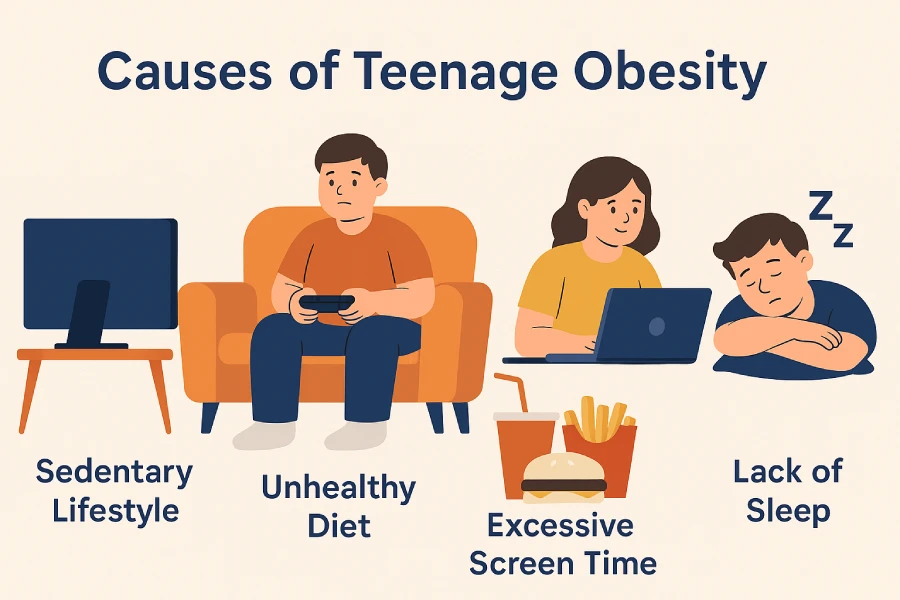Why Teenage Obesity Is a Growing Problem
Over the last few decades, teenage obesity has skyrocketed across the world. According to the World Health Organization (WHO), the number of obese adolescents has nearly quadrupled since 1975.
Today, it’s not unusual to hear about 13- or 15-year-olds dealing with health issues that used to affect mostly adults, like diabetes or high blood pressure.
But why is this happening?
What has changed?
More importantly—what can we do about it?
In this article, we’ll dive deep into the main causes of teenage obesity, explain the science in simple terms, and suggest real-world tips for prevention.
What Exactly Is Teenage Obesity?
Before we talk about causes, let’s quickly understand what teenage obesity means.
Obesity in teenagers is defined as having a Body Mass Index (BMI) above the 95th percentile for age and sex. In simple terms, it means carrying excess body fat that can seriously affect health.
It’s not just about appearance; it’s about health risks that can last a lifetime if not addressed.
The Main Causes of Teenage Obesity
Here are the top causes that researchers and doctors agree upon:
1. Sedentary Lifestyle: The #1 Silent Killer
Remember the days when kids played outside for hours after school?
Today, many teens come home, sit on the couch, scroll TikTok, play Fortnite, and binge Netflix—often for 5 to 8 hours daily.
Sedentary behavior (long periods of sitting or lying down) slows metabolism, weakens muscles, and promotes fat accumulation.
✅ Fact: Teens should get at least 60 minutes of physical activity every day, according to CDC guidelines—but most don’t.
2. Excessive Screen Time
Closely linked to a sedentary lifestyle is screen addiction.
Studies show that teens today spend more time on screens than ever before:
- Watching YouTube
- Playing online games
- Scrolling social media
- Texting and chatting
Every extra hour of screen time increases the risk of weight gain because:
- It cuts into physical activity time.
- It promotes mindless snacking.
- It exposes teens to junk food advertising.
✅ Tip: Set a maximum of 2 hours recreational screen time per day.
3. Unhealthy Eating Habits
You’ve heard it before, but it’s worth repeating: You are what you eat.
Common dietary mistakes among teenagers:
- Skipping breakfast
- Eating lots of fast food and processed snacks
- Drinking sugary sodas and energy drinks
- Low fruit, vegetable, and fiber intake
Eating high-calorie, low-nutrient foods leads to energy imbalance: more calories coming in than going out.
✅ Simple Change: Encourage home-cooked meals, water instead of soda, and easy fruit snacks (like bananas or apples).
4. Lack of Sleep
Teenagers need 8–10 hours of sleep each night.
However, most teens today sleep less because of late-night screen use, academic pressure, and social activities.
Sleep deprivation affects two critical hormones:
- Ghrelin: Increases hunger
- Leptin: Decreases the feeling of fullness
The result?
A tired teen eats more junk food and moves less.
✅ Action Step: Create a calming bedtime routine and limit phone use an hour before bed.
5. Genetic and Family Factors
Genes do matter. If a teenager’s parents are overweight or obese, their risk of obesity rises dramatically.
However, genetics are not destiny.
Family behaviors—like eating habits, activity levels, and attitudes toward health—have just as big an impact as DNA.
✅ Important: Families should model healthy habits together rather than focus only on the teen.
6. Mental Health Challenges
Stress, anxiety, and depression are rising fast among teenagers.
Unfortunately, these conditions often lead to emotional eating and reduced motivation for physical activity.
Food becomes a comfort tool—especially sugary, high-calorie foods.
✅ Pro Tip: Teach teens healthy coping strategies like journaling, exercising, or talking with a counselor.
7. Environmental Factors
Not every teen has access to safe parks, sports facilities, or healthy food stores.
In many urban areas:
- Walking and cycling aren’t safe or practical.
- Affordable healthy food options are limited.
- Fast food is cheap and everywhere.
This “obesogenic environment” makes it easier to gain weight and harder to live healthily.
✅ Idea: Community programs and schools can play a major role in offering safe exercise opportunities.
How All These Causes Work Together
Here’s the problem: It’s not usually just one cause.
It’s a combination.
Example:
A teen spends 5 hours gaming after school, eats chips and soda during that time, skips dinner, sleeps poorly, and wakes up exhausted and stressed the next day.
Result: Slow weight gain that becomes obesity over time.
Why Teenage Obesity Matters
Obesity in the teenage years doesn’t just affect the present—it sets the stage for future health issues, including:
- Type 2 diabetes
- High blood pressure
- Heart disease
- Joint problems
- Depression and low self-esteem
- Lower life expectancy
The good news?
Obesity is preventable—and reversible—with early action.
Easy Ways to Prevent Teenage Obesity
Here’s the fun part: Small changes create big results.
🔵 Limit screen time to 2 hours max daily.
🔵 Encourage 60 minutes of movement—it can be fun activities like dancing, basketball, cycling, swimming.
🔵 Focus on whole foods: fruits, veggies, lean protein, whole grains.
🔵 Promote regular sleep schedules.
🔵 Support mental health by encouraging open conversations and professional help if needed.
🔵 Be a role model: If parents exercise and eat healthily, teens are far more likely to do the same.
Small Steps, Big Impact
Teenage obesity isn’t about lack of willpower—it’s about living in a world that makes unhealthy choices easy and healthy choices hard.
By understanding the main causes like sedentary living, poor diet, excessive screen time, and mental health issues, we can create an environment where teens can thrive.
✨ Encourage small daily changes.
✨ Celebrate progress, not perfection.
✨ Most importantly, focus on building a lifestyle that’s joyful, not stressful.
Teenagers have the power to build habits now that will carry them into a strong, healthy future.
FAQs About Teenage Obesity
What are the main causes of teenage obesity?
Sedentary lifestyle, unhealthy diet, excessive screen time, lack of sleep, genetics, mental health struggles, and environmental factors.
How does screen time affect teenage obesity?
More screen time reduces physical activity, increases mindless snacking, and exposes teens to unhealthy food marketing.
Can teenage obesity be reversed?
Yes! With consistent healthy habits—balanced eating, regular exercise, good sleep, and mental health support—teens can lose weight and build strength.
Is teenage obesity a genetic problem?
Genes play a role, but lifestyle habits have a much bigger impact.
Why is sleep important for preventing teenage obesity?
Lack of sleep messes with hunger hormones, causing overeating and weight gain.




